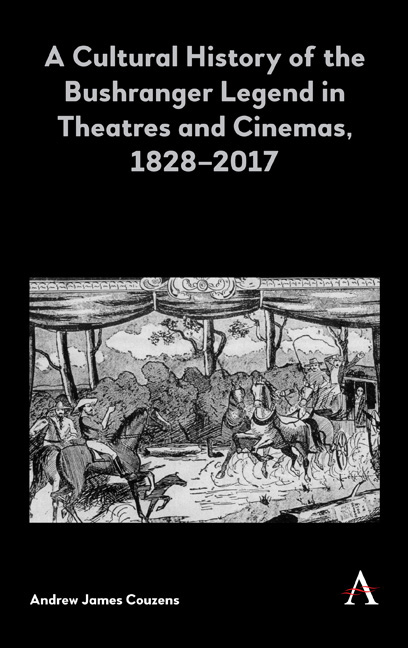Book contents
- Frontmatter
- Contents
- List of Figures
- Acknowledgements
- Introduction: Defining the Bushranger Legend
- Part 1 Establishing the Legend
- 1 The First Bushranger Melodramas
- 2 Alfred Dampier and the Nationalist Melodrama
- 3 Wild West Shows and Wild Australia
- 4 Hippodramas and Edward Irham Cole
- Part 2 Developing the Legend
- Part 3 Fragmenting the Legend
- Conclusion
- Bibliography
- Index
2 - Alfred Dampier and the Nationalist Melodrama
from Part 1 - Establishing the Legend
Published online by Cambridge University Press: 14 February 2019
- Frontmatter
- Contents
- List of Figures
- Acknowledgements
- Introduction: Defining the Bushranger Legend
- Part 1 Establishing the Legend
- 1 The First Bushranger Melodramas
- 2 Alfred Dampier and the Nationalist Melodrama
- 3 Wild West Shows and Wild Australia
- 4 Hippodramas and Edward Irham Cole
- Part 2 Developing the Legend
- Part 3 Fragmenting the Legend
- Conclusion
- Bibliography
- Index
Summary
The nineteenth century was a time of rapid change for the Australian colonies. Successive governors endeavoured to encourage agricultural rather than penal development. The inhabitants became less British exiles and more colonial residents. A nascent nationalism began to develop that was primarily concerned with defining itself as distinct from Britain. These changes laid many of the foundations for the characteristics of the bushranger legend. In this chapter, I will therefore interrogate how the popular representation of bushrangers on late nineteenth- century stages communicated and developed a budding national mythology. Conventions such as the bushranger's deep familial and community ties emerged in the late nineteenth century as a response to the shifting social context, the emergence of new types of bushrangers and a desire to reach popular audiences. This was the formative period for the bushranger legend.
The three plays considered in Chapter 1 had one obvious similarity: in all three, the bushrangers were escaped convicts. They were therefore exiles of Britain and Ireland rather than inherently Australian figures. Over the following few decades, the emphasis on Australia's role as a penal colony shifted dramatically. The colonial government gradually released convicts, either permanently or on tickets- of- leave, and provided them with land. Free settlers also took advantage of generous land grants for those with capital and the colonies became increasingly seen as agricultural settlements. Transportation to New South Wales officially ceased in 1850. The discovery of gold in the early 1850s encouraged vast numbers of migrant workers to try their luck digging up this mineral resource. Australia's population began to explode, not with convicts, but with free migrants who sought riches in this new land. At the same time, a pastoral squattocracy consolidated their land holdings and agricultural interests. In this turbulent environment, a new highwayman emerged. A gang of bushrangers including Frank Gardiner and Ben Hall dramatically brought this new type of bushranger to public attention on 15 June 1862 with the Eugowra gold escort robbery. Gardiner, Hall and their gang were not escapees like Brady, Stalwart and Melville's three bushrangers. Where the escaped convicts’ primary concern was survival and escape from pursuit, the gold rush bushrangers were more glamorous and dramatic, whether thought of as heroes or villains. These rogues mainly targeted the gold escort and mail carriage.
- Type
- Chapter
- Information
- Publisher: Anthem PressPrint publication year: 2019



